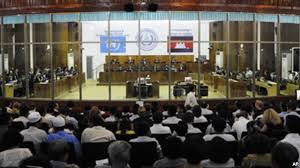This morning brought the news that finally, after eight years, the final two verdicts of Guilty have been made in the UN’s Tribunal to bring the Khmer Rouge to account for the atrocities they committed against their own people nearly fifty years ago.
The UN-backed Tribunal of international and Cambodian jurists started in 2006. It has been greatly criticised for costing too much, over $200 million dollars, and for doing too little. Only a small handful of people were brought to trial, the first of which, prison director Kaing Guek Eav (known as Duch), was sentenced to life in prison in 2011. After that conviction, only four remained to be tried, one of whom, Former Foreign Minister Ieng Sary, died in 2013, while his wife, Social Affairs Minister Ieng Thirith, was determined to be unfit to stand trial due to ill health. But today, the final two were convicted and sentenced to life in prison: Khieu Samphan, an 83-year-old former head of state, and Nuon Chea, the Khmer Rouge’s 88-year-old chief theorist.
Two hundred million dollars, eight years, three life imprisonments. That, versus a four year reign of terror where two million people — a quarter of the country’s population — were killed. The trials have been plagued by allegations of corruption, stories of workers storming out due to lack of pay, foreign lawyers being refused rights to appear in court due to extortionate fees and unwieldy red tape. For many, the tribunal began as a sign of hope and turned into a cruel joke.
But despite all the time and the controversy, the Tribunal and its verdicts are important. Genocide of the sort perpetrated by Pol Pot and the Khmer Rouge continues today in too many places around the globe. Ideology turned into madness is a recurring theme in history, and one which still hangs as a threat to many of us. What if we did nothing, shrugged our collective shoulders and muttered, “so it has always been, so it will always be”? That response would be much worse.
The scars inflicted on those who lived through the terror of the Khmer Rouge can never be truly healed. The country remains in a state of, what some have called, a nation-wide post-traumatic stress syndrome. But how much worse would it be if nothing was ever said about it, if no acknowledgement was ever made by the present government or the international community? And the youth of today? Believe it or not, many of them hardly know it happened, and many don’t believe the stories they hear. But that sort of collective amnesia and revisionist history is hugely dangerous. The young Khmer of today must know what happened fifty years ago. Much is happening in their country now. In order to make informed decisions, they must be able to put today’s occurrences on the streets of Phnom Penh into some sort of historical context. It is hugely important that people around the world awoke to today’s news that, yes, Year Zero and the Khmer Rouge tragedy did happen. Yes, people must be held accountable for their crimes. Yes, power can not be used as a weapon against one’s own people.
The UN-backed Tribunal in Cambodia does not go far enough. It costs too much money. It has been hijacked for political purposes and has even been said to be a spit in the eyes of the people who have already suffered too much. But nonetheless, all the people of Cambodia deserve what little justice it is able to offer, and all the people of the world need to see that there are citizens of the world who, despite obstacles and frustrations, will continue to work to ensure that human rights are upheld and crimes against it are punished.



Recent Comments